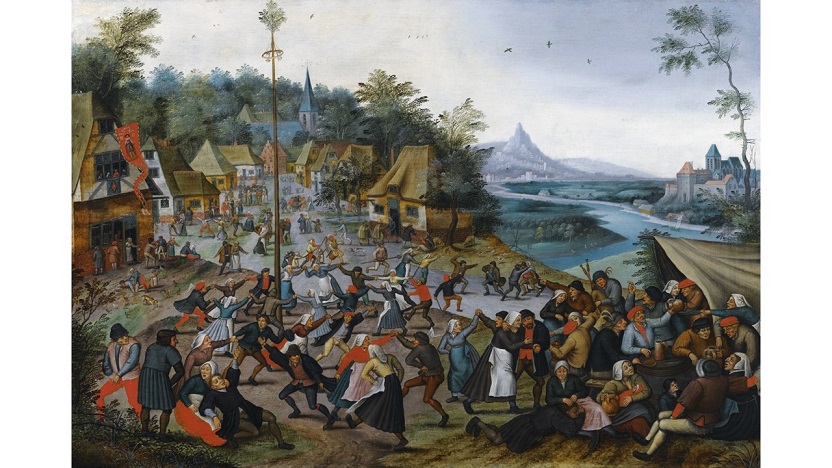.
May Day
Note: Maypoles were a feature of ancient Roman festivals to mark
the renewal of Spring. The feast days of Saints Philip and James
were celebrated by the Church of England in May.
Having hewed a length of pine,
__They drove it in the ground;
Then word was spread throughout the town,
__“Ye comers gather round.
Now let us make a joyful song
__And share with all good cheer;
The stage is set, the men have brewed
__Ten barrelsful of beer.”
And so began the merriment,
__Commencing with the drum,
A cannon shot, a round of fire,
__And instruments to strum.
They took the streamers in their hands
__And danced around the pole;
They sang in praise of saints who died
__To save the mortal soul.
They feasted well, and all the day
__Was full of heady mirth;
To see the goddess Maia bring
__The seasonal rebirth.
.
.
Cheryl Corey is a Connecticut poet. She is also an author of short stories, a novella, and recently completed a novel.




Perfect length, perfect, sing-song pitch.
Thanks for the read, Cheryl – it’s made my May Day.
Nice work, Cheryl. The bright tone and lyrical verse really capture the sense of occasion. It’s extremely sad that these long-standing customs have so rapidly fallen from fashion so it’s nice to see them being commemorated in verse.
I don’t know that it’s celebrated anywhere anymore. If it is, maybe someone can let us know. Or has this too become symbolic of “white supremacy”?
Happy to make your day Paul!
This is truly a charming poem, Cheryl, which I enjoyed reading. I can easily imagine it being set to music and sung around that maypole. You have skillfully blended pagan and Christian themes as an accurate reflection of the holiday’s origin. I do have a question of whether you meant “mortal” or “immortal” in the fourth quatrain? It might harm the meter, but I think “immortal” works better for a reference to the saints. But I confess I might be missing an aspect of your intent here. If so, mea culpa. Either way, well done!
I believe Ms. Corey is making an elision of /e/ and /i/ there, which in eighteenth-century texts might have been printed like this:
th’mmortal soul (for “the immortal soul”)
We don’t make such printed elisions of this sort today, since in most cases the vowel elisions are easily recognized by the reader as he scans the line. But this one is not immediately apparent. I was wondering about it too.
You know, Brian, you’re absolutely right! It’s a technical error on my part. It really should read “immortal” or, as Dr. Salemi points out, be written as an elison. I think that at times you can be so close to our own work that you don’t see your mistakes. It takes eagle-eyed readers like you and Dr. Salemi to point out the obvious. Just goes to show – you really do have to scrutinize every word, every line, and carefully think.
A happy poem of celebration, the energy of it and giving us an example of a former ritual.
What a joyous work, Cheryl! And what a teaching moment for those attentive to detail. Your poem makes me want to do what I’ve never done in my life: dance around a Maypole.
Cheryl, what I notice in your sprightly little lyric is reference to vast worldwide vegetation celebrations. Certainly May Day is being celebrated somewhere. The Communists, as latecomers to the mix, are parading on May 1. Maypoles of phallic symbolism are being set up and danced around in primitive cultures that haven’t forgotten the orgy requisite to good harvests. You have Roman and German, ancient and modern, religious and secular touches in your five stanzas.
The Roman Martyrology declares that May 1 is the birthday of the Apostles Philip and James the Less. This makes it one of three double birthdays of apostles in the year (the others being Peter and Paul on June 29, and Simon and Jude on October 28). A birthday is not just the feast day, but the actual day the apostle shed his blood to sanctify earth and enter heaven. Special privileges are attached to such days, even though the Catholic Church now celebrates Saint Joseph the Worker on May 1 (in order to counteract Communist revels), and has transferred the feast of Philip and James to May 11.
Congratulations to you for taking notice of the traditional rituals of “seasonal rebirth.” Just do a search for May Day celebrations and you will find Maypoles! Maybe your poem will encourage more next year, but beware of the Puritans who still (rightly and wrongly) consider them abominations.
I have been to many a May Day Fayre and reveled in the handkerchief waving, lithe leaps of the Morris Dancers round the maypole. There are strange goings on at these fayres… ferret racing being one of them. The obstacle courses for ferrets are serious business… not designed for the faint-hearted ferret. You have captured the essence of May Day beautifully and have me craving a trip back to my homeland with your fine words, Cheryl. Thank you!